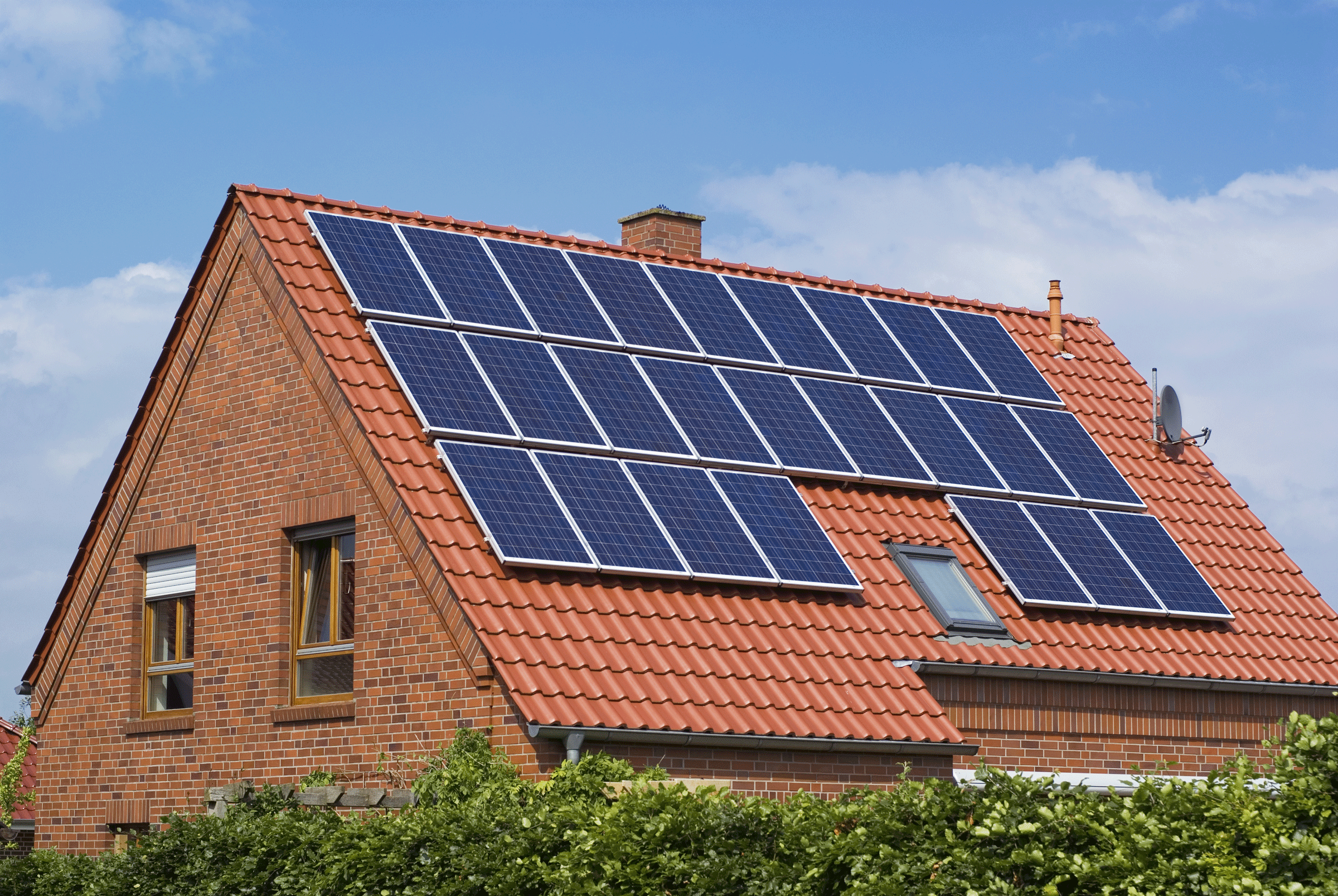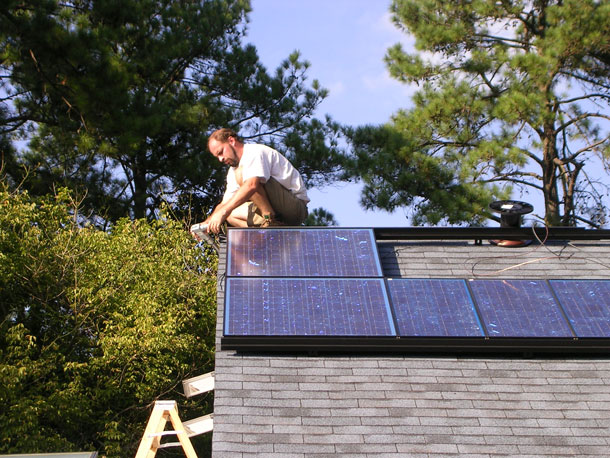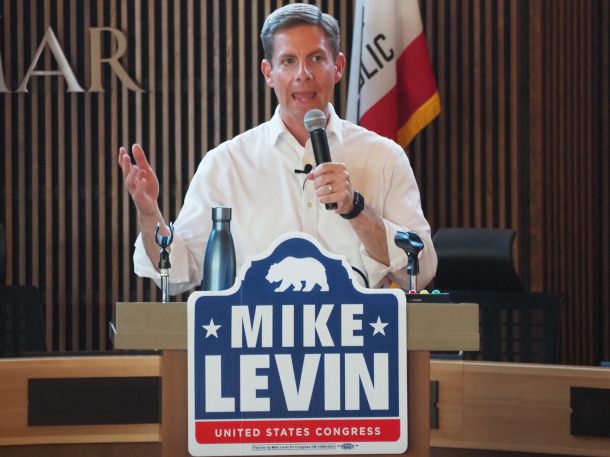Defense Production Act for Domestic Solar
Air Date: Week of July 15, 2022

The Defense Production Act will help to make the U.S. a leading producer of renewable energy technologies in a time where markets are gravitating towards renewable energies and away from oil, gas, and fossil fuels. (Photo: birgstockphoto.com)
President Biden invoked the Defense Production Act to stimulate domestic production of clean energy technology including solar panels and heat pumps. Congressman Mike Levin from California joins Host Steve Curwood for details.
Transcript
CURWOOD: From PRX and the Jennifer and Ted Stanley Studios at the University of Massachusetts Boston, this is Living on Earth. I’m Steve Curwood.
In February, a small solar company in California claimed China was avoiding tariffs on solar panels. So the Commerce Department started investigating shipments from several south-east Asian countries. The prospect of stiff tariff penalties immediately devastated the US solar installation business, and thousands of workers were laid off as projects were canceled or put on hold. So, Democratic Congressman Mike Levin of California led a campaign urging President Biden to take action. President Biden then placed a two-year freeze on the tariffs, and also moved to accelerate the production of domestic solar panels, as currently about 80% are imported. The Biden Defense Production Act order also boosts domestic production of other electric grid components as well as heat pumps, insulation, and hydrogen technology. For more, we are joined now by Congressman Mike Levin. Welcome to Living on Earth!
LEVIN: Thanks so much for having me, Steve, good to be with you.
CURWOOD: What are the powers of the Defense Production Act being invoked? And what limitations do you see to the impact that it can have?
LEVIN: By using the Defense Production Act, I think it will enable a rapid growth. I think what we're seeing right now, particularly with Putin's invasion of Ukraine, is the only way we're going to be truly energy independent is if we're clean energy independent. A lot of my friends and colleagues across the aisle talk about ramping up domestic supply of fossil fuels. And in the near term, perhaps that is something that will need to happen, but certainly that's not a good long term strategy. The other thing I would say is a Defense Production Act will hopefully help with the challenges of our global supply chain with regard to the solar industry, and the need to onshore manufacturing jobs as well. So I think it's one of the important tools in the toolkit. And I'm hopeful that it will be up to the task to advance a clean energy economy.
CURWOOD: How important is it that the President United States invoke the Defense Production Act to get going on the construction of solar cells in this country?
LEVIN: I think it's incredibly important. We're going to transition to a clean energy economy in the United States and around the world. And I believe the Old Wayne Gretzky quote, you know, the hockey player, where he said, skate to where the puck is going to be, not to where the puck is. And we know where the energy economy is going to be 20, 30 years from now, and it's all renewables. Global demand for solar and all the other components is set to skyrocket, some estimates have up to a 600% increase in the need for these technologies. Unless we move now to expand the technologies here at home, we risk getting priced out of clean energy technologies and having to rely on expensive foreign made components. Solar, as we know, is the largest source of new electricity being generated, and it's also the cheapest new electricity source for many parts of the country. And so I'm thrilled the President took this step. President also said he would delay any new tariffs on the American solar industry for at least the next couple of years. And ultimately, it's going to get us further along the path towards clean energy independence, where we're going to lower energy costs for families and strengthen our national security.
CURWOOD: Now, the prices for solar panels are still high for folks looking to install them on their own roofs. How soon do you expect prices to come down?
LEVIN: Well, I'm hopeful that consumers are going to see benefits in the very short term. And I know that we're now on track to deploy tens of gigawatts in the next few years, it's going to be enough to power millions more homes. And ultimately, we've got to make sure that we bring those costs down so that it's a no brainer. When you consider putting solar on the roof of your home, particularly given in many parts of the country, such as in Southern California, you've got rising electricity costs from the utilities, it really does become that much easier to make that leap. This is a step in the right direction to bring these costs down as well.

Nearly 80% of the jobs in the solar industry come from the demand-side sector, through jobs such as installation. (Photo: Melanie Bateman, Flickr CC BY-NC-ND 2.0)
CURWOOD: Now what other programs or legislation needs to be enacted or implemented for the Defense Production Act to achieve its full unintended effect?
LEVIN: Well, look, I think we have to remain committed to passing a reconciliation package that has strong climate provisions at the core. I know we're talking right now, in real time, about a few hundred billion dollars in tax incentives for clean energy. It'll help us not only meet our climate objectives, but also will help leverage these investments we're talking about that the administration is making through using the Defense Production Act.
CURWOOD: Some would say Congress is too gridlocked to get that done. Your take?
LEVIN: Well, look, I think that we're all going to be looking very closely at the climate and energy related provisions in the bill. Senator Manchin says he's committed to having provisions in the bill that would advance a clean energy future. We're gonna hold him to that. And we look forward to reviewing the bill when it's ready.
CURWOOD: What kind of pushback is the Biden administration facing for his invocation of the Defense Production Act?
LEVIN: Well, it's inevitable that the fossil fuel industry will push back on any measure to advance renewables. I would anticipate that, I'm sure there'll be more of that to come as more of those larger projects go online. But we're going to just keep going where the markets and where long term climate objectives demand. We are heading towards a much cleaner grid. And the key again, is whether or not those technologies, those companies of the future, those jobs in manufacturing, whether they're going to be here, or they're going to be elsewhere.

Congressman Mike Levin, long-time proponent of renewable energies, led the letter to President Biden, urging him to take action to relieve the solar industry of dire consequences wrought by the Department of Commerce’s investigation of solar panels manufactured from south-east Asian countries. (Photo: Public Domain)
CURWOOD: Some cynics suggested that the fossil fuel industry's hands were someplace in the background when it came to the imposition of a solar tariff. Your views?
LEVIN: I've wondered that myself, Steve, there are different companies that before this whole tariff fiasco, frankly, I'd never heard of that all of a sudden were saying that they represented the domestic solar industry, but when I've spoken to different companies and trade groups in the past, it was clear to me that the vast majority of our domestic solar industry, they just want to be globally competitive. And that's why I led a letter this spring urging the administration to make the common sense decision to delay any of these new tariffs.
CURWOOD: A big part of your goal as a member of Congress is to build a sustainable and renewable future, as you said many times. So how seriously do these developments like the Commerce Department investigation, or the recently decided West Virginia versus EPA case in front of Supreme Court—to what extent did they impair your ability to do so?
LEVIN: Well, I'll feel a whole lot better if we could get a reconciliation vehicle done that has robust climate investments along the order of magnitude we're discussing. But make no mistake, the extreme Supreme Court decision on the West Virginia case impeding the ability of the EPA to reduce greenhouse gas emissions, I felt was wrong, legally, and also disastrous from a policy perspective. It is unrealistic to expect Congress to write legislation that is so prescriptive as to anticipate every potential thing that could happen down the road. The Congress of the United States, with broad bipartisan support, gave the Environmental Protection Agency wide latitude under the Clean Air Act, and the Clean Water Act, and the National Endangered Species Act, and the National Environmental Policy Act. You name it, Congress has given the EPA the latitude it needs to do its job. And only now, after the disastrous decision, are we seeing winding back of the EPA's fundamental ability to do its job. And again, this was not partisan up until just a handful of years ago. So that's why again, it's so important that we try to come together around a reconciliation framework that includes a clean energy deal. And I'm certainly not going to stop until it's done.
CURWOOD: Congressman Levin, you're in your 40s. Sometimes in Congress, people are serving there in their 80s. So if we were to take a look at what the United States Congress had done, and was doing, say, 40 years from today, what do you expect to see at that time, knowing what you know now?
LEVIN: Well, I hope that we're leading the world dealing with the climate crisis with the seriousness that science demands. And I think a lot about this issue, in the context of how my own children, who are now 10 and 8 years old, are going to grow up. Are they going to grow up and know that my generation was up to the challenge when the science was so overwhelming? Or will they see a missed opportunity? Look, for all the challenges that we face, I think that we can't keep our eyes off the importance of the climate crisis. So I think it's our responsibility not to allow petty politics of the past that allow fossil fuel interests to win the day. I hope that I can look back in 30 or 40 years and know that we gave it our all to do the right thing.
CURWOOD: Congressman Mike Levin is a Democrat from California. Thanks so much, Mike, for taking the time with us.
LEVIN: Steve, thank you. It's been great to be with you.
Links
Living on Earth wants to hear from you!
Living on Earth
62 Calef Highway, Suite 212
Lee, NH 03861
Telephone: 617-287-4121
E-mail: comments@loe.org
Newsletter [Click here]
Donate to Living on Earth!
Living on Earth is an independent media program and relies entirely on contributions from listeners and institutions supporting public service. Please donate now to preserve an independent environmental voice.
NewsletterLiving on Earth offers a weekly delivery of the show's rundown to your mailbox. Sign up for our newsletter today!
 Sailors For The Sea: Be the change you want to sea.
Sailors For The Sea: Be the change you want to sea.
 The Grantham Foundation for the Protection of the Environment: Committed to protecting and improving the health of the global environment.
The Grantham Foundation for the Protection of the Environment: Committed to protecting and improving the health of the global environment.
 Contribute to Living on Earth and receive, as our gift to you, an archival print of one of Mark Seth Lender's extraordinary wildlife photographs. Follow the link to see Mark's current collection of photographs.
Contribute to Living on Earth and receive, as our gift to you, an archival print of one of Mark Seth Lender's extraordinary wildlife photographs. Follow the link to see Mark's current collection of photographs.
 Buy a signed copy of Mark Seth Lender's book Smeagull the Seagull & support Living on Earth
Buy a signed copy of Mark Seth Lender's book Smeagull the Seagull & support Living on Earth

